Last Updated on December 6, 2024 by Steve
Introduction
There are scant details of a typical Jewish wedding in the Bible. The only passages that come close are in the Parable of the Ten Virgins and the wedding in the village of Cana where Jesus performed His first miracle urged on by His mother. Typically Jewish weddings of maidens would occur in the middle of the week on a Wednesday.1 This would give time for the bride to prepare herself for the groom’s arrival and as we will see preparation is key for the bride to make it to the wedding.
This agrees with the Ten Virgins parable in Matt. 25:1–13 because we see that the instruction to the disciples and believers is to keep watch because the bridegroom (Jesus) is coming. We are told in the parable that the bridegroom arrived at midnight which was half an hour late. Bridegrooms usually arrived at 11:30pm so he was late. The point is that we do not know the exact hour that Jesus is coming. The bigger question is when does the wedding occur in terms of the tribulation period. The pre-tribulation position is that the church is raptured and the wedding takes place in heaven with the feast lasting seven years being a sort of parallel to the Jewish custom of wedding feasts lasting seven days.2 Another view is that the wedding takes place at the very end of the tribulation. In this article I will discuss why I think the actual wedding takes place in the very middle of the 70th week in a secret wedding chamber and then the bride is presented at the end when the wedding feast then takes place before the invited guests. The key passage is Rev. 19:1–10.
The unexpected wedding
David E. Aune in the Word commentary on Rev. 19:7 says that the mention of a wedding at this point in chapter 19 is entirely unexpected. That is certainly a key insight because I thought the same thing when studying this passage of Scripture. The reason is that John has just finished mentioning the destruction of the great prostitute, Babylon, in vv. 2–3 and how the whole of heaven is rejoicing that God has finally executed His judgment on the NWO Babylonian system epitomised by the modern city of New York and its great men. But when does the beast get rid of the harlot woman? In previous chapters and in my blog Timeline of the Five Angels – part 1 we see that as soon as the beast (Antichrist) rises from the abyss one of the first items on his agenda after killing the two witnesses is to destroy the woman, the great city that rules over the kings of the earth.3 The beast arises at the halfway mark of the seven year tribulation period after 1260 days at the 5th trumpet judgment.
The mention of a wedding at this point (halfway point of tribulation) is entirely unexpected.
It is clear to me that the reason the wedding of the Lamb is mentioned at this point is because it happens immediately following the destruction of Babylon (New York) in the narrative. This is when the woman of Revelation chapter 12 enters into the wedding chamber in the safe place located in southern Jordan. The woman (saved Israel and a remnant of the church)4 take refuge during the final 3 ½ years of the seven-year tribulation after listening and heeding the secret message of the 144,000 during the first 1260 days.
The wedding chamber is none other than the sheepfold (Bozrah) and possibly Petra which offers protection for 1290 days during the Great Tribulation. The sheepfold offers protection to the sheep at night and the Great Tribulation is surely the darkest night in history when the devil and his cohort run amuck. For 3 ½ years, all hell will break loose however the woman (the bride) will be safe and out of reach from the clutches of the devil and his beasts, safe and secure in the sheepfold. This is why the wedding is mentioned in chapter 19 because it immediately follows God’s judgment on the prostitute thus giving the timing.
When does the wedding banquet take place?
Rev. 19:9 is the fourth of seven blessings in Revelation. It is a certain blessing to be invited to the wedding feast or banquet of the Lamb. An important question is when does this banquet occur? The banquet is not the same word as the wedding in v. 7 (gamos) which is also used in the “Parable of the Ten Virgins” in Matt. 25:10. In v. 9 here this is the banquet or feast (deipnon). It is a meal and the celebration of the wedding. The feast occurs after the wedding and the custom in Jesus’ day was to have the wedding on a Wednesday but the feast takes place later at the beginning of the Millennial Kingdom.5 The invited wedding guests would celebrate with a great wedding feast. The bride’s veil would be removed so that everyone could see who she was. Notice the reference to the “veil” and “covering” in Isa. 25:7. Upon the consummation of the wedding, the veil and covering was removed from the bride and she was intimate with the groom. Notice also that the veil and covering had been spread over ALL NATIONS. This veil is removed once the bride exits the bridal chamber out of the sheepfold. Micah 2:12–13 KJV tells how “The Breaker” (King Jesus-the bridegroom) breaks out of the gate leading His bride. Further proof is in Isa. 63:1–6 when Isaiah asks the question, “Who is this coming from Edom, from Bozrah, with his garments stained crimson?” This is Jesus who then treads the winepress and begins His campaign of destroying and dealing with His enemies (firstly the tents of Edom6) culminating at Armageddon ten days later. Following behind Him is His bride and the armies of heaven.
The Chuppah (bridal canopy)
The sheepfold is the perfect picture of the bridal chamber or the chuppah.7 According to Jewish custom the word chuppah means covering or protection, and is intended as a roof or covering for the bride and groom at their wedding. It has a definite legal purpose: It allows the couple’s new status of marriage to be actualized, and it is the legal conclusion of the marriage process that began with betrothal. Remember our betrothal commenced at conversion. The chuppah symbolises the bridal chamber, where the marital act was consummated in ancient times.
Interestingly Psalm 19:5 speaks of a bridegroom emerging from his chuppah, while Joel 2:16 says, “Let the bridegroom emerge from his chamber, and the bride from her chuppah.” This really makes sense when you consider that the Breaker in Micah 2:13 KJV says that the King (Jesus) breaks out of the sheepfold. This happens at the end of the tribulation period. The Jewish wedding was a private affair to be away from the crowds such as the market-place and this separation is what the chuppah symbolised. Bozrah (the sheepfold) perfectly illustrates this principle.
Who is the bride?
The big question is who is the bride who has made herself ready?8 It is none other than the five wise virgins who enter the wedding chamber. All ten virgins were potentially bridal material but only five had made themselves ready by having oil for their torches. See the article Parable of the ten virgins for further insight. At conversion to Christianity on earth we are all betrothed to Christ but that doesn’t mean everyone necessarily becomes the bride. That depends on faithfulness and the bride making herself ready. There is no greater picture in the Old Testament than the story of Rebekah and Isaac…
In the story in Genesis chapters 22–24, God revealed the plan He has for His Son and His bride by using typology. In the account, Abraham is a type of God the Father, Eliezer, Abraham’s servant is a type of the Holy Spirit, Rebekah is the Bride of Christ and Isaac is Jesus. In the story, Eliezer had to go to the right place where there were potential brides within the wider family group. Rebekah is identified as “the daughter of Bethuel son of Milkah, who was the wife of Abraham’s brother Nahor.” This would have made Rebekah a great-niece to Abraham and second cousin to Isaac. Abraham had been looking for a wife for his son, Isaac, but he was unwilling for Isaac to marry a Canaanite—Abraham and his family were living in Canaan at the time. So Abraham sent his servant to his own kinsmen, to the city of Nahor, to find a wife for Isaac.
Likewise as the potential Bride of Christ we have to be in the family (believers) to even potentially qualify but that is not all. There was a test for the bride and Rebekah passed the test. She further qualified because she was not only willing to give Eliezer a drink of water but willing to water his ten camels. This meant that Rebekah would have been willing to gather up to 2000 litres of water from the well—simply amazing! And what is expected of the Bride of Christ? Faithfulness and righteous acts and somebody who is ready and keeping watch.
So, we are all potentially the bride but very few will be ready and waiting to escape to the wedding chamber in the safe place in Jordan when the the Abomination of Desolation is standing in the holy place in the temple.9
Who are those who receive an invitation to the wedding supper?
The term “invited” in v. 9 refers to a formal summons to friends and relatives to join in the festive occasion of the wedding supper of the Lamb and His bride. It doesn’t refer to the bride herself. The bride is not summoned—it refers to the friends not the bride herself! The bride represents the faithful wise virgins who have proven themselves as discussed previously. Everyone else (the saved) will receive an invitation to the banquet (not the wedding which occurs in Bozrah beforehand). My guess is that they will either be friends of the bride (rest of the church) or friends of the bridegroom (Old Testament saints). John the Baptist in fact declared himself to be a friend of the bridegroom because he was an Old Testament believer.10
Luke 22:28–30 further says those who eat and drink at his table (wedding banquet) in the kingdom are those disciples who have persevered in the trials. It means the great trials that are going to come upon those in the last days. Many will come from east and west, north and south and sit at the table in the kingdom of God.11 Those who are not there and who are not invited will be thrown outside into the darkness where there will be weeping and gnashing of teeth.12
- Tim Warner: https://4windsfellowships.net/articles/rapture_21.pdf [↩]
- Judges 14:10–20 [↩]
- Rev. 17:16–17 [↩]
- Mic. 2:11 [↩]
- Isa. 25:2,6–7 [↩]
- Psa. 83:6 [↩]
- https://www.chabad.org/library/article_cdo/aid/476806/jewish/Chuppah-The-Bridal-Canopy.htm [↩]
- Rev. 19:7 [↩]
- Matt. 24:15–16 [↩]
- John 3:29 [↩]
- Matt. 8:11, Luke 13:29 [↩]
- Matt. 8:12 [↩]




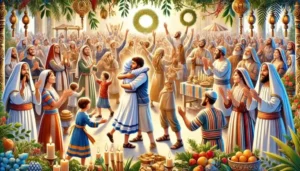
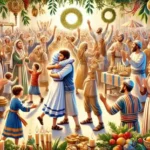
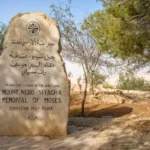
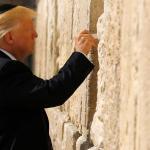


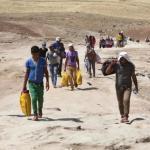



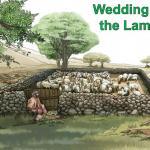
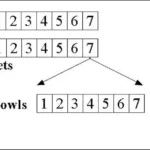
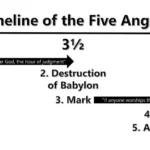
2 Responses
Thanks for all the research Steve and information. God’s continued blessings . Ray
https://www.heraldofhope.org.au/the-virgin-mary/?mc_cid=51060e0842&mc_eid=8499264914
Check out the Herald of Hope website.